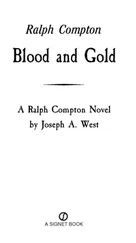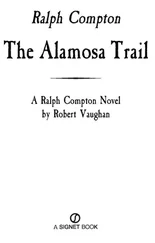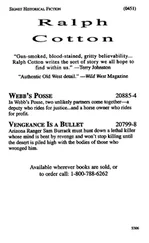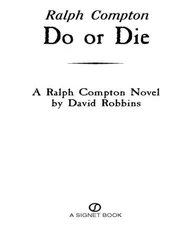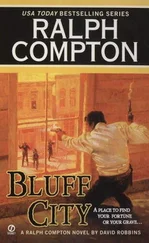The next day Hanks called all the cowhands together and Epp Scott came from the ranch house to address them. Epp had an announcement to make.
‘‘To continue to prosper the Circle V must grow. Before Dan Morgan’s untimely end, he and I had talked about how best to do that. He agreed with me that a good start would be to bring in more cattle. We don’t use nearly enough of our range. I intend to use more. Every square foot will be put to use from here on out.’’
The punchers looked at one another. To overgraze a range was to risk disaster. But they did not say anything.
‘‘More cows means more work for you,’’ Epp continued. ‘‘It also means I will be hiring new hands to help out, and I trust you will make them feel at home at the Circle V.’’
The punchers assumed it would be a while before the new hands showed up. Normally, an announcement was placed in the Tucson newspaper, and as word spread, men looking for work drifted in. But the very next day two new men were added, and three more the day after. Four more were signed on a bit later, from where the punchers couldn’t guess.
Right away the Circle V hands noticed a few odd things about the newcomers. They kept to themselves and always worked and ate together. The new foreman did not mind. In fact, when a herd of new cattle was brought in, Hanks put the cows in charge of the new hands.
Resentment flared. The old hands did not like the special treatment given the new hands. They especially did not like it that some of the new hands put on airs and swaggered around as if they owned the Circle V.
Then something happened that took their minds off the new punchers and set tongues to wagging about their boss.
A woman arrived at the Circle V. She came in a buggy early in the afternoon, a pink parasol shielding her from the sun. She wore a dress that was much too tight and showed too much cleavage. Several trunks came with her. To the collective amazement of the punchers, she was promptly installed in the ranch house, in the very bedroom Lillian had slept in.
Her name was Alice Thorpe and she hailed from New Orleans. That much Maria the cook learned, and passed on the information. How and where Epp Scott met Alice Thorpe was a mystery until Maria overheard Alice say to Epp that she had her doubts about giving up the excitement Ranson offered for the boredom of ranch life.
The discontent grew when Blin Hanks did not do as much work as the punchers felt he should. Hanks certainly did far less than Dan Morgan. He seldom ate with them and seemed to take it for granted that they knew what to do and would do it without bothering him. Hanks spent a lot of time at the ranch house.
Maria was the source of the news that the second night after Alice Thorpe showed up, Epp and Thorpe and Hanks drank enough to put a regiment under the table. Maria also hinted of carryings-on of which Maria did not approve. She would not go into detail.
Then a puncher was shot.
His name was Bob Carver and at seventeen he was the youngest. He was out working the south range and happened to drift toward the barrens in search of strays. Bob never saw who shot him, but he heard the shot and felt the pain of the slug when it cored his shoulder. He reined around to flee and another shot nearly took his head off.
When another puncher found him, young Bob was still in the saddle but so weak from loss of blood he was barely conscious. The puncher brought him to the bunkhouse and Epp Scott was sent for. Epp was none too happy. With Hanks in tow, he examined the wound, oversaw the bandaging and listened to Bob’s brief recital of how he was wounded.
The punchers expected sympathy and outrage.
Instead, Epp snapped, ‘‘What in hell were you doing near the barrens anyway? I gave word that no one was to go near there. Weren’t you told?’’
‘‘We were told not to go in them,’’ Bob weakly answered.
‘‘In. Near. It is all the same. See that you never go near them again.’’
And that was it. Epp did not investigate. He did not gather the men and race to the barrens to find the culprit. He acted as if the shooting was of no consequence.
That was when the muttering started. The punchers spent every spare minute huddled in bitter resentment of the state of affairs. And the more they muttered, the more bitter they became. The discontent was a disease that spread from hand to hand.
A pall of gloom hung over the Circle V. At meal-times the punchers ate mostly in silence, picking at their food with little enthusiasm. They went about their daily work with even less.
Their unhappiness did not escape notice. They were at supper one evening when the door opened and in strode Epp Scott. Hanks, as usual, was at his elbow. Epp came straight to the head of the table.
‘‘I want to know why I haven’t seen any of you smile in days.’’
An older puncher called Pete was the only who answered. ‘‘We are eating.’’
‘‘I can see that. But it is not your stomachs I came here to talk about. It is the long faces I keep seeing out my window. I would swear we were about to have another funeral.’’
‘‘If that was a joke it was in poor taste,’’ said a cowboy by the name of Jeffers.
‘‘Start talking,’’ Epp said.
‘‘Do you want it all at once or in bits and pieces?’’ From Pete.
‘‘I am a grown man. I can take it whole.’’
Pete looked at the other punchers and several nodded. ‘‘All right. Since you asked.’’ He did not hold back. When he was done an expectant hush fell, with all eyes on Epp.
‘‘If that is how you and some of these others feel, I have this to say.’’ Epp raked them with a glare. ‘‘Pete, you are fired. Gather your plunder. First thing in the morning throw your war bag in the buckboard. I will pay you what is due and you will be taken to Tucson. The same with anyone else who does not like the changes I have made.’’
Many a sun-weathered faced mirrored shock.
‘‘Only those who want to ride for the Circle V need stay on. Freaks are not welcome. Those who whine make life miserable for those who don’t, and I will be damned if I will put up with it.’’
‘‘I have been here seven years,’’ Pete said.
‘‘Then you should know better than to air your lungs behind my back,’’ Epp said. ‘‘Do you think I don’t know what has been going on? My house has windows, and some of the other hands have talked.’’
‘‘You mean the new ones,’’ Jeffers said.
‘‘I will not name names. Make up your minds, all of you. Either you work for me without griping or you will be on the drift. It is up to you.’’ Epp pivoted on his boot heels and strode out, Hanks slightly behind him.
‘‘How many do you reckon will quit?’’
‘‘Two or three at most,’’ Epp predicted.
‘‘That’s all? You were awful hard on them.’’
‘‘I had to shake them up. Make them realize I am the big sugar and I will by God not stand for their shenanigans. Nip it in the bud, as the saying goes.’’
‘‘How long before those who stay become suspicious?’’ Hanks asked.
‘‘Never, if we do this right. They will work the legal cows and you and your men will work the rustled herds. So long as your men keep their mouths shut, there should not be a problem.’’
‘‘My boys know what to do. Don’t you worry.’’
Epp stopped so suddenly that Hanks nearly walked into him. ‘‘If I don’t, who will? Worry is what keeps me from making mistakes. It shows me where we need to improve. Worry is good.’’ He walked on.
Hanks waited until they reached the porch to ask, ‘‘Wouldn’t it be easier to get rid of all those who worked for your pa and bring in an entire new outfit?’’
‘‘The punchers we cut loose would talk. And before long people would start to wonder why I let them go. It might raise suspicion where we do not want suspicion raised.’’
Читать дальше

